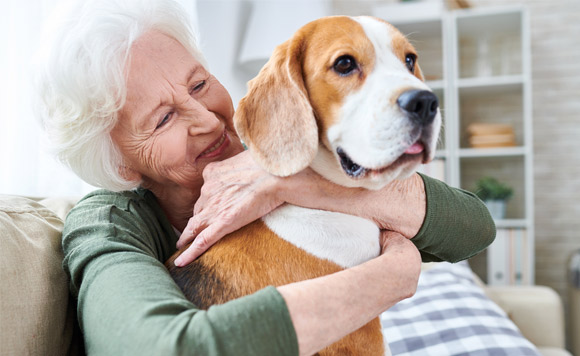by Sherrin Griffin, Sidney SeniorCare –
At first it seemed odd to mix “kids and pets” as per this issue of Seaside, but as a woman who has always stood out as the mother with the “furry child,” it really does make sense.
Pets: my absolute favourite subject on this earth … next to seniors, of course. Although my lifelong affinity for animals, often trumping my relationships with the human populace, has not always been met with approval or understanding, I think my family and friends finally “get it.” I believe now that my parents and mother-in-law have finally accepted that they have a “grand dog” instead of a grandchild, and although I felt guilt-ridden for years for denying them their obligatory branch of the family tree, I know they secretly look forward to snuggling with their unconventional grandchildren.
Now, as a middle-aged woman, I have pondered my choice to adopt children only of the furry variety but, as I approach my senior years, I am confident that my pets will take care of me in ways that are different, yet surprisingly similar, to human children. And, just between you and me, they may even be better at it!
• The love of a pet is unconditional and constant. While relationships with people can be challenging and confrontational at times, our pets love us with no judgement or hidden agendas. Their motives and adoration are pure. For seniors who have lost a spouse or other loved one, a pet can help to fill that void.
• Pets are great company. In my humble opinion, there is no better roommate than a pet. Pets don’t argue, compete for TV shows or expect a gourmet dinner cooked for them. A live-in pet for a senior offers companionship and comfort to assuage loneliness and/or depression if family members or friends do not live close by.
• Pets are good for our health. Countless studies prove how interacting with a pet (even fish) helps to lower blood pressure, create a sense of calm and reduce anxiety and stress, elevating feel-good endorphins including serotonin and dopamine in our brain. Hospitals, hospices and other institutions are now using service or therapy dogs on a regular basis, as well as allowing personal pets for visitation.
• Caring for a pet gives us purpose. After retirement, when children have left the nest, seniors are often at odds with not feeling needed anymore. That need to nurture and be responsible for someone or something can be fulfilled with a pet. Regardless of the type, all pets instill a “raison d’être” and add healthy routine to our lives.
• Pets can increase mobility. Studies have consistently illustrated how beneficial regular exercise is to overall health and increased longevity. Seniors tend to be more sedentary as they age and pets can prompt them to be more active with walks, and indoor or outdoor play. Pets such as dogs can be good choices for seniors who have good mobility or need to increase their mobility as dogs’ needs force us outside for regular walks. Even cats can be trained to walk outside on a leash.
Pets keep us young with their unadulterated love, sense of fun and playful nature. As we enter our golden years, pets become the perfect companion; reliable, steadfast, and true, with extraordinary healing powers and uncanny intuition. For those of you who have human children, I challenge you to rival that!




